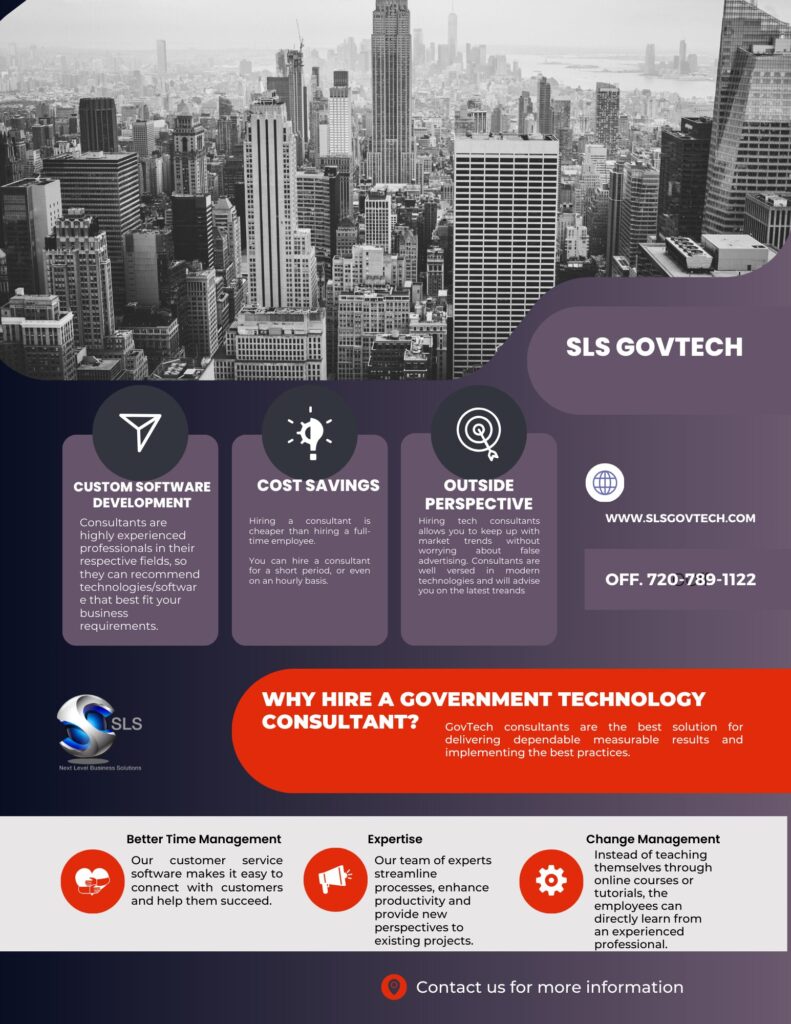A government technology consultant pays close attention to the details and has advanced analytical skills. Furthermore, SLS government technology consultants listen to your business requirements and will customize a platform to meet your needs. Our consulting team will also work with your team to assist with your change management needs.
Hiring a government technology consultant can benefit agencies and organizations in many ways. This includes bringing specialized skills and knowledge to the table. Government technology consultants stay updated with the latest trends, best practices, and emerging technologies. This expertise can be invaluable in the rapidly evolving landscape of technology. Technology consultants are experts who advise businesses and governments on improving their productivity. They also help to streamline business processes and enhance productivity. Additionally, they provide new perspectives to existing projects. Tech consultants can also help companies build their features and improve their offerings.

Consultants are an integral part of government technology development. Their importance is growing steadily in the industry.
- Revenue spent in IT consulting and implementation is projected to be $72 billion in 2024.
- Revenue is expected to show an annual growth rate (2024-2028) of 4.72%, resulting in a market volume of $87 billion by 2028.
- The average spending per employee in the IT consulting and implementation market is projected to reach $20 billion in 2024.
Government IT Consultants can provide cost-effective solutions by helping agencies streamline their processes, adopt efficient technologies, and make informed decisions. They can also assist in optimizing existing systems, potentially saving time and resources.
Additional Reasons to Hire Professional IT Consulting Experts
- Objective Perspective: External consultants offer an unbiased and objective perspective. They need to be entrenched in the internal politics or culture of the organization, allowing them to provide impartial assessments and recommendations. This objectivity can be crucial in making strategic decisions.
- Problem-Solving: Consultants are skilled at solving specific problems or challenges. Whether implementing new technology, addressing cybersecurity concerns, or improving overall IT infrastructure, consultants can offer targeted solutions based on their experience.
- Project Management: Government tech consultants can assist in managing and implementing technology projects. They bring project management expertise to ensure that projects are on time, within budget, and according to specifications.
- Change Management: Introducing new technologies or processes requires a cultural shift within an organization. Consultants can guide change management strategies, helping employees adapt to and embrace new technologies more effectively.
- Regulatory Compliance: Government agencies often have to adhere to strict regulatory requirements. Technology consultants can assist in ensuring that the organization’s IT systems and processes comply with relevant regulations, mitigating legal and compliance risks.
- Capacity and Resource Augmentation: Consultants can fill the gap when a government agency needs more internal expertise or resources for a specific project. They can temporarily provide additional workforce and skills, helping the organization achieve its goals.
- Strategic Planning: Consultants can assist in developing long-term technology strategies aligned with the goals and objectives of the government agency. These strategies can involve assessing current technology infrastructure, identifying areas for improvement, and creating a roadmap for future development.
- Training and Knowledge Transfer: Consultants can train internal staff, transferring knowledge and skills that will benefit the organization beyond the duration of the consulting engagement. They enhance the capabilities of the in-house team.
In summary, hiring a government technology consultant can provide valuable external expertise, efficiency, and strategic guidance to help government agencies navigate the complexities of technology implementation and management.
Should You Hire a Professional IT Consultant?
Whether or not to hire a technology consultant depends on your specific business needs, goals, and circumstances. Here are some factors to consider when deciding whether to bring in a technology consultant:
Complexity of the Project
If your organization has complex IT requirements, such as implementing new systems, upgrading infrastructure, or integrating diverse technologies, a technology consultant can provide the expertise needed to navigate these complexities.
Lack of In-House Expertise
If your internal IT team lacks specific skills or experiences required for a particular project, a consultant can fill the gap. This is particularly relevant for specialized areas like cybersecurity, data analytics, or emerging technologies.
Strategy and Planning
If you are developing or revising your IT strategy, a technology consultant can provide valuable insights. They can align your technology initiatives with your overall business goals, ensuring that your IT investments contribute to your success.
Efficiency and Optimization
Consultants can assess your current IT processes and infrastructure to identify areas for improvement. This can lead to increased efficiency, cost savings, and better utilization of resources.
Project Management
For complex technology projects, having a consultant with strong project management skills can be crucial. They can ensure that the project is delivered on time, within budget, and meets your objectives.
Risk Management and Security
If you’re concerned about cybersecurity threats or compliance issues, a consultant can help assess and strengthen your security measures. They can also guide you in developing risk mitigation strategies.
Technology Adoption
If you’re looking to adopt new technologies or innovate within your industry, a consultant can provide guidance on the latest trends, help with technology selection, and support the implementation process.
Cost Effectiveness
While hiring a consultant comes with a cost, it can be more cost-effective than hiring full-time employees with specialized skills for a short-term project. Consultants can provide their expertise on a temporary basis.
Training and Knowledge Transfer
If your team needs training on new technologies, a consultant can facilitate the learning process and transfer knowledge to your staff, ensuring that they can effectively use and maintain the implemented solutions.
In Summary
Evaluate the potential benefits against the costs to make an informed decision based on your organization’s unique circumstances.
